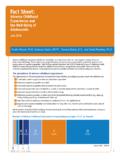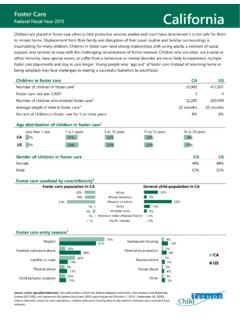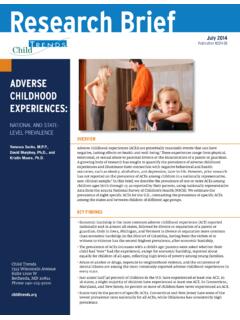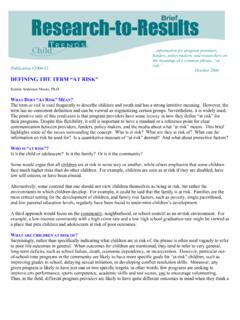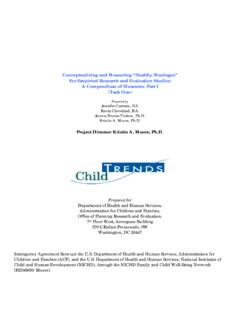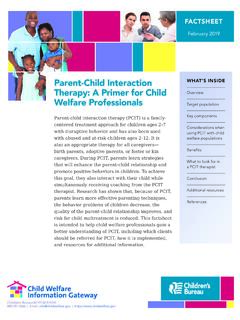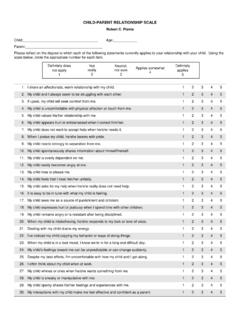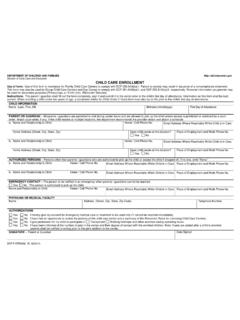Transcription of Parental Relationship Quality and Child Outcomes Across ...
1 Publication #2011-13 4301 Connecticut Avenue, NW, Suite 350, Washington, DC 20008 Phone 202-572-6000 Fax 202-362-8420 Parental Relationship Quality AND Child Outcomes Across SUBGROUPS Kristin A. Moore, , Andrea Kinghorn, and Tawana Bandy, April 2011 OVERVIEW Numerous studies have found links between the Quality of the parents Relationship and positive Outcomes for children and Yet very little research has examined whether this association holds Across various population subgroups, especially among disadvantaged Is the Quality of the parents Relationship really associated with Outcomes for children of low-income couples? For ethnic minority couples? For unmarried couples?
2 To address this issue, Child Trends analyzed data from the 2007 National Survey of Children s Health. Analyses focus on more than 64,000 respondents3 whose children were between the ages of six and 17. Results indicate that the parents Relationship Quality is very consistently and positively associated with a range of Child and family Outcomes , including: Child behavior problems (externalizing), Child social competence, Child school engagement, Child internalizing (depression), parent- Child communication, and Parental feelings of aggravation. This association holds Across varied subgroups, including: white, black and Hispanic couples; married and cohabiting couples; lower and higher income families; boys and girls, teens and younger children, immigrants and non-immigrants; and parents with post-secondary education, a high school education, and less than a high school education.
3 In addition, the association holds in all but one comparison when social and economic differences are taken into account. BACKGROUND In recent years, studies have examined the association between Parental Relationship Quality and conflict and children s ,5,6,7 This research suggests that, on average, parents in higher Quality relationships tend to have better-adjusted children with more positive attitudes toward marriage, who themselves are more likely to have Quality relationships and , 9 However, a number of the studies on this topic are limited by a lack of nationally representative samples with information on both Parental Relationship Quality and Child Outcomes . In addition, many studies ignore couples in cohabiting ,11 These limitations have led some scholars to ask if Parental relationships matter for all children, or whether it is generally a middle-class phenomenon.
4 12,13 Rarely have researchers had access to data that allow them to examine whether the benefits of healthy Parental relationships cut Across social, economic, and racial/ethnic subgroups. Recent data from the National Survey of Children s Health (NSCH) now make such analyses possible. In addition to Child Outcomes , we also examine parent- Child communication and Parental aggravation, because parenting appears to be a critical pathway by which healthy Parental relationships affect positive Child ,15,16 High levels of stress and anger from difficult relationships can spill over to 2 parents interactions with their ,18 This spillover affects Child Outcomes ranging from physical health, to academic success, to psychological and social Outcomes .
5 This body of research has led to several large-scale random assignment evaluation studies that are exploring whether Relationship education can improve marital and Relationship Quality and, thereby, enhance Child Outcomes in lower income populations. CURRENT ANALYSES In this brief, we analyze reported Parental Relationship happiness Across six Child and family Outcomes to determine whether the association between Parental Relationship Quality for Child Outcomes holds Across subsets of the population. This brief uses a measure of Relationship happiness that separates those who describe themselves as completely happy, very happy, fairly happy, or not very happy to address the positive skew on self-reported As noted, these analyses draw upon a sample of 64,076 children between the ages of six and 17, living with two parents from the 2007 wave of the NSCH.
6 The large sample size allows us to examine this association for an economically, racially, and ethnically diverse cross-section of respondents (see box on page 8). FINDINGS The results of our analyses are reported in full in Table 1. The overwhelming number of statistically significant associations detailed in Table 1 makes it clear that Child Outcomes are better when the reported happiness of their parents Relationship is higher. Almost without exception, the lowest levels of positive Child Outcomes are found among children in families where the parent reports that their Relationship is not too happy. In contrast, the best Child Outcomes are found almost without exception among children whose parents report that their Relationship is completely happy.
7 Positive Child Outcomes for children whose parents report a very happy Relationship are generally second highest, and children whose parents have a fairly happy Relationship fall next. This pattern holds Across various subgroups of Child gender, Child age, family type, race and ethnicity, immigrant status, parent education, and family income. Recognizing that the data are cross-sectional ( , collected at one specific point in time instead of over several or more years) and causality cannot be determined, the overall pattern suggests that the Quality of parents relationships matters for children in every sub-population, almost without exception. To illustrate the associations we find, specific examples are provided below. As shown in Figure 1, and as found in other research, children who come from socioeconomically disadvantaged homes are less likely to be described as socially Within each category of family income in relation to the federal poverty level, however, the critical issue for these analyses, one can see that children with happier parents are more likely to be socially competent.
8 3 FIGURE 1: Child s Social Competence by Parental Happiness and by Family Income Relative to the Federal Poverty Level (FPL) FIGURE 2: Child s School Engagement by Parental Relationship Happiness Across Racial/Ethnic Groups Figure 2 depicts children s school engagement Across racial/ethnic groups. Within each group, children whose parents have a happier Relationship are more likely to be engaged in school. 4 FIGURE 3: Parent- Child Communication by Parental Relationship Happiness Across Family Structure Types Figure 3 reports on parent- Child communication Across family structure types. As seen in the figure, parent- Child communication tends to be better for those families in which both parents are married. However, within each family type, parent-communication is reported much more positively when parents are in a happier Relationship .
9 FIGURE 4: Child s Externalizing Behavior by Parental Relationship Happiness Across Parent Education Levels 5 Figure 4 reports on Child externalizing behavior Across parent education levels. As seen above, children are more likely to exhibit positive behaviors if they are from more educationally advantaged homes. That is, children with better educated parents are less likely to engage in externalizing behavior. The important finding here, however, is that within each education level, children whose parents have happier relationships tend to engage in fewer problem behaviors. MULTIVARIATE ANALYSES It is, of course, the case that Relationship happiness reflects many influences, such as economic stress, and parent education. However, results of multivariate analyses indicate that, after controlling for Child age, Child race/ethnicity, family structure, family poverty level, and Parental education, all but one of the associations depicted in Table 1 remained statistically The only exception is internalizing behavior ( , being depressed, withdrawing from others) with immigrant status.
10 CONCLUSION These results confirm findings from previous studies that, when parent Relationship Quality is high, their families and children have better Outcomes . While having a Child who is flourishing can contribute to the Quality of a parent s Relationship , considerable research indicates that Relationship Quality can also predict children s development. Our analyses extended previous work to address a very important question how general is the association between Relationship Quality and Child Outcomes ? In sum, we found that happy Parental relationships are quite consistently related to better Outcomes for children and families Across all types of subgroups. That is, this association holds not only for economically or educationally privileged families and children, but also holds Across varied economic, racial, ethnic, and family structure subgroups.
